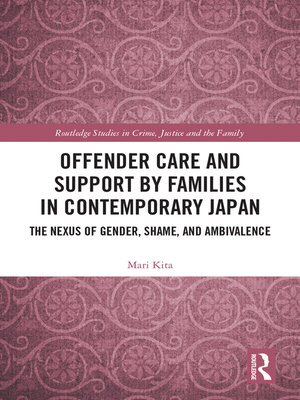Offender Care and Support by Families in Contemporary Japan
ebook ∣ The Nexus of Gender, Shame, and Ambivalence · Routledge Studies in Crime, Justice and the Family
By Mari Kita

Sign up to save your library
With an OverDrive account, you can save your favorite libraries for at-a-glance information about availability. Find out more about OverDrive accounts.
Find this title in Libby, the library reading app by OverDrive.



Search for a digital library with this title
Title found at these libraries:
| Loading... |
Because people's contact with the criminal justice system comes in different shapes and forms, scholars are now broadening their analytical scope and examining the overall repercussions of criminal justice contact on families of offenders. Compared to Western societies, Japan is known for its lower crime rates and more pronounced use of informal social control. Thus, it offers a useful research site for examining how families in a low-crime society experience criminal justice contact and how they function as an integral part of the nation's crime control mechanism.
This book considers the role of the family in the lives of offenders and the criminal justice system in Japan. Looking particularly at gender and patriarchal power relations, it reveals how cultural notions of femininity prompt the criminal justice system to rely on women as its proxy. This book explores how families of offenders often step in to fill the voids left by criminal justice institutions and social services to provide offenders with all-inclusive care. The burden of supervising and rehabilitating offenders on top of the expectation to atone for the crimes also renders families ambivalent and ashamed. Whereas the state and criminal justice authorities tend to see offenders' families as a crucial resource for prisoner reentry, this book highlights the necessity for addressing families' needs before automatically assuming their support. It also pushes the boundaries of feminist criminology by showing how women can be affected by male criminality and male-dominated criminal justice institutions, other than as victims and offenders.
An accessible and compelling read, this book will appeal to students and scholars of criminology, sociology, gender studies, Japanese culture and all those interested in learning more about the criminal justice system in Japan.






